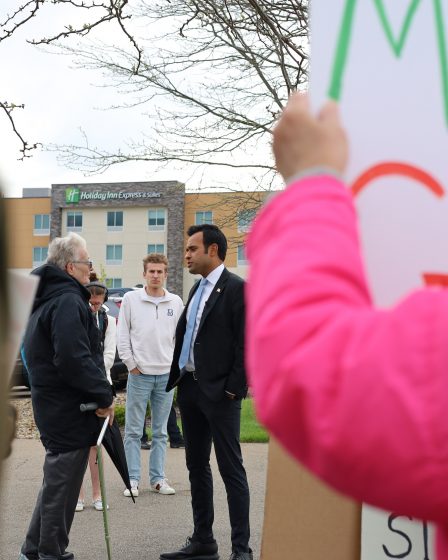Atlas Dwyer Contributing Writer Matthew Herbst, professor of hellenic studies at the University of California, San Diego, gave a lecture in Lean Lecture Hall titled “Reflections on Water and Power, from the Ancient to the Contemporary World,” on April 24. Herbst was introduced by Professor …
News
Protesters outside of Wooster Republicans dinner speak with gubernatorial candidate and keynote speaker Ramaswamy
Julia Garrison Gianna Hayes News Editors Around 70 protesters stood on the corner of Friendsville and Riffel roads in uptown Wooster, holding signs that prompted car horns and thumbs up from passing cars. “Ohio says NO to Vivek,” said one sign. Another protester waved a …
All-campus budget meeting provides updates on 2025 budget deficit, impact of enrollment challenges
Helen Oriatti-Bruns Chief Copy Editor On Thursday, April 24, David Jones ’88, vice president for finance and business, hosted an all-campus budget meeting. Jones provided updates on Wooster’s forecasted budget deficit for fiscal year 2025 and on the College’s financial projections for fiscal year 2026. …
Co-founder of BirdieLight spreads awareness on fentanyl overdoses and provides free Narcan and test strips
Nemsie Gonzalez Managing Editor On Monday, April 21, at 7 p.m. in Allen Commons, The College of Wooster was joined by Dr. Beth Weinstock, a co-founder of BirdieLight, to educate students on fentanyl overdose prevention. BirdieLight aims to combat fentanyl overdoses through education. Beth and …
Ohio news briefs
Julia Garrison News Editor
Genre-defying Dua Saleh headlining WAC’s 2025 Springfest; to be supported by indie rock aussie Birksie
Julia Garrison News Editor Wooster Activities Crew (WAC) has announced the lineup for their largest event of the year: Springfest. Springfest, which occurs every spring semester following I.S. Monday, brings musical artists across genres to campus –– handpicked by WAC –– with the support of …

